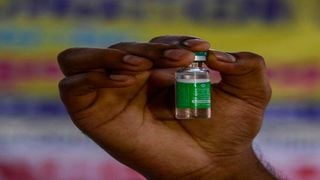
A health worker shows a vial of the Covishield vaccine against the Covid-19 coronavirus, during a vaccine drive organized by the non-governmental organization (NGO) 'Anubhav' in Siliguri on June 17, 2021.
| Diptendu Dutta | AFPNews
Premium
Why Kenyans travelling to EU are now being turned away
What you need to know:
- individuals have been told the EU does not recognise the licensed Indian version of AstraZeneca vaccine (Covishield) which is currently being rolled out in Kenya and most African countries.
A number of Kenyans intending to travel to some European Union (EU) countries say that their visa applications have been rejected despite having been fully vaccinated against Covid-19.
The individuals have been told that the EU does not recognise the licensed Indian version of AstraZeneca vaccine (Covishield) which is currently being rolled out in Kenya and most African countries.
Travellers are usually required to provide a recent Covid-19 negative PCR test or show evidence of being fully vaccinated— with some countries requiring the meeting of both conditions. However, stranded Kenyan travellers have complained that many EU countries have rejected both the negative test and proof of full vaccination.
This comes even as Denmark, which is an EU member state, earlier this month pledged to donate 358,700 unused vaccine doses to Kenya adding that the batch of AstraZeneca that expires July 31 should be delivered as soon as possible.
Speaking to the Saturday Nation, affected Kenyans, who sought anonymity to avoid victimisation, said they were disappointed to be caught up in a situation beyond their control as the Kenyan government did not indicate there were problems with the vaccine.
“I have urgent business meetings to attend to and now I can’t go anywhere, this is so unfair and demoralising,” the victim told Saturday Nation.
This week, a social media user raised concerns after his friends were denied visas to the EU.
“Just discovered that Covishield, the Indian AstraZeneca licenced version is not recognised by @EuinKenya @EU_commision @EMA_NEWS so not acceptable for travel. Pure racist discrimination. What are you doing about it?” Mr Chris Foot Tweeted.
“Pure geopolitics”
In an email response to Saturday Nation, a high ranking envoy from the EU in Kenya office confirmed that indeed those immunised with Covishield were being turned away.
“The approvals for vaccines for use within the European Union are issued by the European Medicines Agency (EMA). We are aware that the Covishield vaccine produced in India has not yet received the EMA approval, but the EMA is currently examining it.
“The EMA looks at the vaccine manufacturer’s requests as they are submitted. AstraZeneca requested the approvals for the EU approved version several months ago, while the India version (Covishield) request came in much later. Hence the delay,” said the statement.
It went on: “We cannot pre-empt the decision of the EMA, so there is no guarantee but the indications are that likely outcome is likely to be positive for Covishield. “A decision is due in the coming weeks.”
The official statement further explained that while entry to specific countries within the EU is a prerogative of the member states, vaccinated persons are allowed to travel to the EU if they are fully vaccinated with an EU approved vaccine – for Kenyans who received such a vaccine abroad and also if they have received the recommended doses during the last 14 days (must present a negative PCR test taken 72 hours prior).
Dr Willis Akhwale, Kenya’s vaccine taskforce chair, termed the predicament “pure geopolitics”.
“I have not seen any official communication on this but India is pharmaceutical power house and this may just be an attempt to counter her prowess and dominance in the market,” the chair said.
Saturday Nation reached out to Serum Institute of India (SII), which declined to comment on the matter but promised a response at a later date.
More on this: Kenyans abroad share Covid-19 vaccination experiences
Purchase deal
On August 27, 2020, the European Commission and AstraZeneca PLC signed an advance purchase agreement for the production, purchase and supply of 300 million doses of the Covid-19 vaccine.
The agreement had an option for a further 100 million doses which were to be distributed to the EU population. This was at a time when a vaccine had not been established or approved but rather was in development.
As of January 2021, AstraZeneca informed the EU that it would only receive about a quarter of the 100 million vaccines they were expecting to receive by March, a shortfall of about 75 million jabs.
This means that AstraZeneca was contracted separately with both the EU and the UK to supply vaccines but according to the EU, it has failed to meet its obligations to supply the required number of vaccines to the EU under the Contract.
AstraZeneca went ahead to have pointed to production problems at their plants, but continues to supply to the UK.
In April this year, the European Commission went ahead to announce that no decision had yet been taken on whether to launch legal action against AstraZeneca over a shortfall in deliveries of coronavirus vaccine doses.
During a briefing on the global response to Covid-19 pandemic in African countries and vaccine sharing, Africa CDC director Dr John Nkengasong expressed disappointment over travel restrictions aimed at locking out Africans from travelling abroad.
“We do not have vaccines why penalise us? We are in touch with the EU and are trying to address the issue of travel.”
USAid Covid-19 Task Force Executive Director, Jeremy Konyndyk during the briefing announced a new package to help Africa navigate the pandemic.





